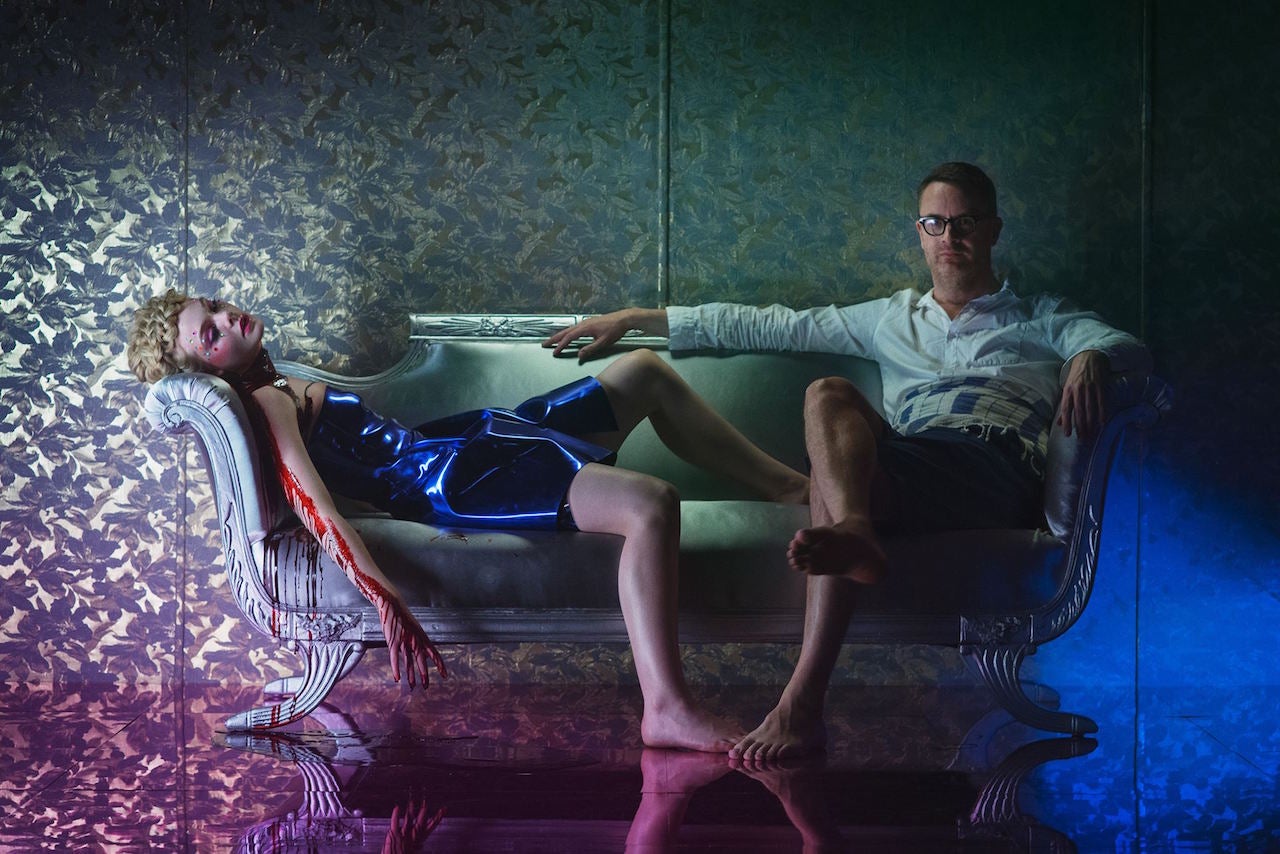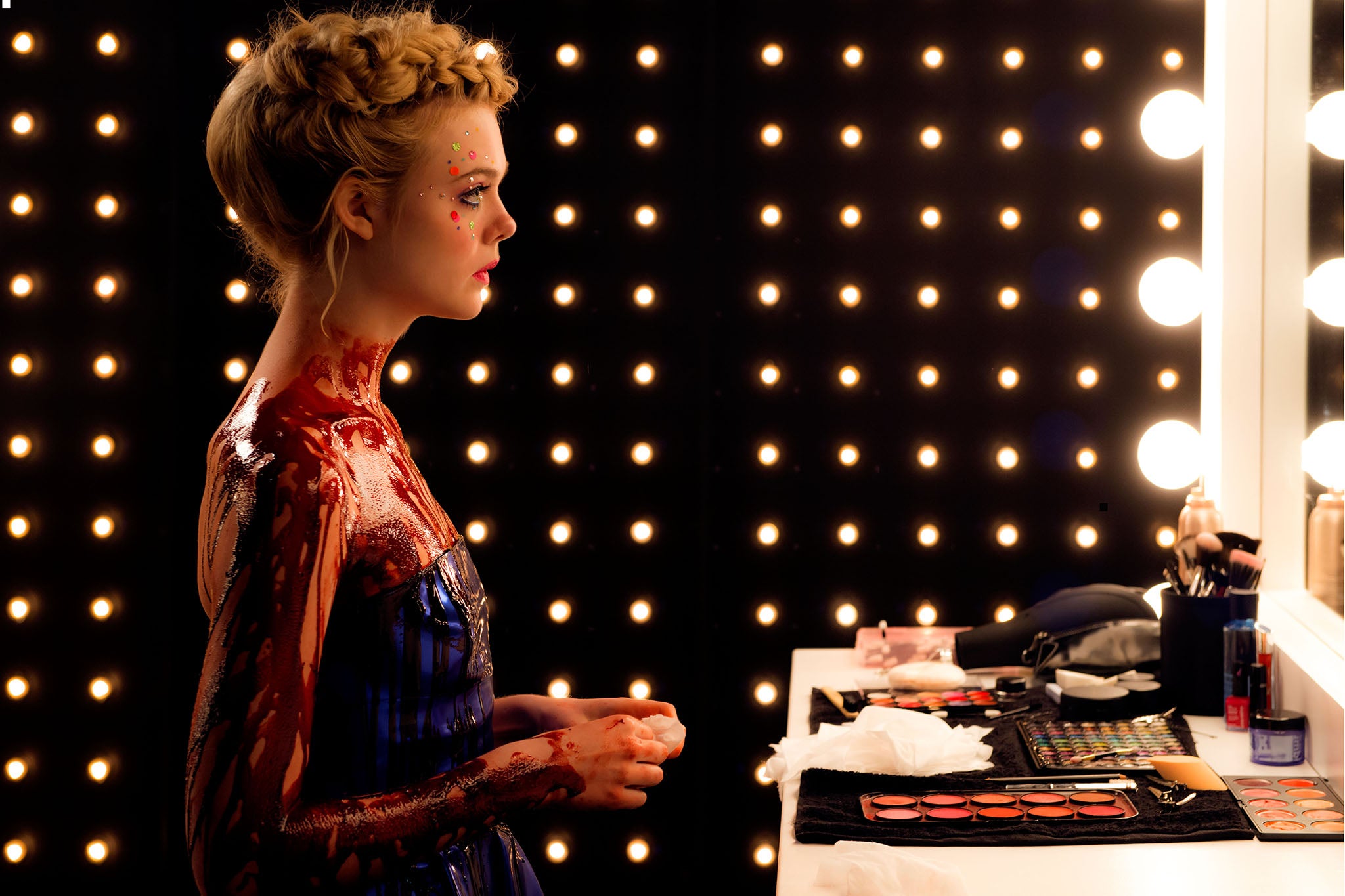Nicolas Winding Refn interview on The Neon Demon: ‘Creativity breeds on fear of failure’
‘If you love it or hate it, I don’t care, because I did it exactly how I wanted to do it. That probably means it is going to polarise. Polarisation is good because then you have been violated’

Your support helps us to tell the story
From reproductive rights to climate change to Big Tech, The Independent is on the ground when the story is developing. Whether it's investigating the financials of Elon Musk's pro-Trump PAC or producing our latest documentary, 'The A Word', which shines a light on the American women fighting for reproductive rights, we know how important it is to parse out the facts from the messaging.
At such a critical moment in US history, we need reporters on the ground. Your donation allows us to keep sending journalists to speak to both sides of the story.
The Independent is trusted by Americans across the entire political spectrum. And unlike many other quality news outlets, we choose not to lock Americans out of our reporting and analysis with paywalls. We believe quality journalism should be available to everyone, paid for by those who can afford it.
Your support makes all the difference.Having directed the likes of Drive, Bronson and Only God Forgives, Nicolas Winding Refn has gradually become one of Europe’s most polarising filmmakers.
Take The Neon Demon, for example. Released earlier this year, the initial critical reaction saw one reviewer award the film five stars while another yelled “Trash!” at the cinema screen.
Like his films, the director himself is quite divisive. In an interview with a reporter from The Independent before the release of The Neon Demon, Refn refused to speak about the upcoming project despite the synopsis and a poster having been released. Then, when interviewed alongside the film’s leading actor, Elle Fanning, he remained characteristically quiet.
When I meet the director to discuss the film's DVD release, there’s an intensity in the air. As you may be able to tell from the transcript below, the 46-year-old made for a quite odd interview experience, offering more questions than answers and often allowing silences between the two of us to be drawn out for extended periods of time. Thankfully, Refn gave some revealing answers about the film, proffering some interesting information about his entire filmmaking process.
Hi, Nicolas. Really enjoyed The Neon Demon. The whole thing has a very occult feel, the three ‘villains’ being very witch-like. Was that your intention?
Yes. They were like the Aleister Crowley disciples. The whole movie was very much designed around the witchcraft ceremony.

What was the inspiration for that?
I wanted to make a film about beauty, and the power of it. If you go through our history, our culture, our mythology, beauty has always been a very dominating factor in our culture. I have two daughters, so I read a lot of fairy tales and beauty is very much a common definition of women. And their power over men is strong. But, with the invention of the fitness centre, physical strength lost a lot of its importance but beauty remained. Beauty is like a new class system. The world is so obsessed with beauty, it has been for the last 2,000 years, it’s the one stock that’s never gone down, the one stock that’s never gone out of fashion. The longevity of beauty has continued to shrink. It's becoming younger and younger, so, eventually, it will always feed on itself, don’t you think?
It’s interesting that you say beauty gives women power over men because, in the film, it seems the men have power over women. For instance, the photographer dismisses the other models when he doesn’t like their look. Or Keanu Reeves’ character. Is that a reversal you wanted to make?
It’s an interesting question because the photographer is only a gateway, he’s not the consumer. The men in the film have no other function other than being servants of the story. The film isn’t about men and women but purely about women where the men have no real function. I don’t think the photographer has any power over women, he’s just a facilitator of a stereotype that the feeding machine wants to eat. But who essentially is eating? Certainly not the men. It’s the women.

Watch Apple TV+ free for 7 days
New subscribers only. £8.99/mo. after free trial. Plan auto-renews until cancelled

Watch Apple TV+ free for 7 days
New subscribers only. £8.99/mo. after free trial. Plan auto-renews until cancelled
The men are gate-masters to facilitating those women going out there.
Yes, but they’re not in control of it. That’s the difference.
Supply and demand, basically.
Yeah, that’s all it is. There’s no difference between how a male photographer or a female photographer would tell models to go away or stay.
How come you cast the photographers as men?
Because it was more interesting in terms of the horror undertone. Her always being vulnerable in a predatorily way.
Elle Fanning’s character [Jesse] is very driven, yet is sometimes naive as well. Is that perhaps what you see in people coming to Hollywood?
Is she naive, though? In an early scene, at the modelling agency, she is asked who took the photographs and replies ‘Oh, just some guy online’. Then, later in the film, he endearingly asks whether the photos came up at the meeting and she lies. The question is, is she manipulating? Naive? Is she Dorothy? She’s many things. Is she self-aware?
She’s self-assured.
When Sarah [Abbey Lee Kershaw’s character] asks, ‘What’s it like being the sun?’ she very matter-of-fact says, ‘Everything you’re not’. When Gigi [Bella Heathcote’s character] reveals all the plastic surgery she’s had to make her beautiful, she defends it by saying no one really likes the way she looks, and Jesse replies, ‘I do’. Every scene has a curl. Sometimes very clear, sometimes not.
Elle’s character is this beautiful woman, yet even when she interacts with this young photographer there is nothing sexual. But then, when she later drives with him after getting into the agency, she’s almost aroused by that victory.
That’s the beginning of the narcissism. You need sexuality, or you need non-sexuality, you need to be very clear. There’s no overt sexuality in the Jesse character because she’s partly a girl becoming a woman who fears penetration. She’s uncertain what she can do, yet she plays in a world of wolves. She’s the lamb, but she’s the one leading them.
Regarding the triangles. Each point, presumably, represents one of the three ‘witches’. [He nods] And the triangles surround her, like the witches?
Yes, like in a ritual. They fence in the lamb, capture her. Then they feed off the lamb.
As the film progresses, the colours are quite drastic, particularly the reds and blues. You're also colour blind: is that something that affects your filmmaking?
I like extremes. The more extreme, the more interesting it becomes.
What meanings did you apply to each colour?
Whatever feels right. For me, it works purely on what I would like to see. Like an infant doing a drawing, I try to make it very simple.
But it still serves a purpose.
Yes. But the purpose is unknown to me until the film is done.
Is that not difficult going into a film?
Well, I shoot in chronological order because of that. So I can see the movie unfold in front of me. I can change it. Mutate it. I can continue. It is like being a painter.
Do people you’re working with ever find that frustrating?
I think, at the beginning, some people can find it frightening, because it's a bit like creative free-fall. But I think creativity breeds on fear.
Fear of?
Fear of failure.
Is that what you fear?
Yeah. I think you have to put yourself in a situation that is so dire. The greatest artists were in a situation where they had to pay their bills. That’s a very convenient way to get very creative very fast. It’s very important to have that constant fear around you. For many years, it was about money, because I never had any money. Things are a little bit different now, so I have to create another kind of fear. Failure.
It’s interesting that you work off the cuff because the shots in your films, like Elle’s character, are so self-assured.
Because I force myself to react purely on my instinct. It’s like the trick, the game. I have to make that instinct as pure as I can because that is success. That is something that can never be taken away from me. That’s my choice. If you love it or hate it, I don’t care, because I did it exactly how I wanted to do it. That probably means it is going to polarise. Polarisation is good because then you have been violated. Violation means you have an emotional reaction to it and that’s the essence of creativity. Good or bad, that’s your Chinese dinner. We spend so much time talking about art being good or bad, or what’s it worth. It’s like, those words have no meaning in creativity. It’s just us trying to create a standard.
I guess when people describe things these days, especially in the internet age, it feels like there is so much hyperbole thrown around, people using extremes to explain things. Are you against that?
No, I’m all for it. I think the internet is the greatest invention since women.
Have you always worked on instinct when making your films?
I started on my first film because I read John Cassavetes did it on his films. I really loved The Killing of a Chinese Bookie and thought ‘If he can do it, I can do it’. Then it became a mantra, a dogma of the process.
The Neon Demon is out now on DVD.
Join our commenting forum
Join thought-provoking conversations, follow other Independent readers and see their replies
Comments